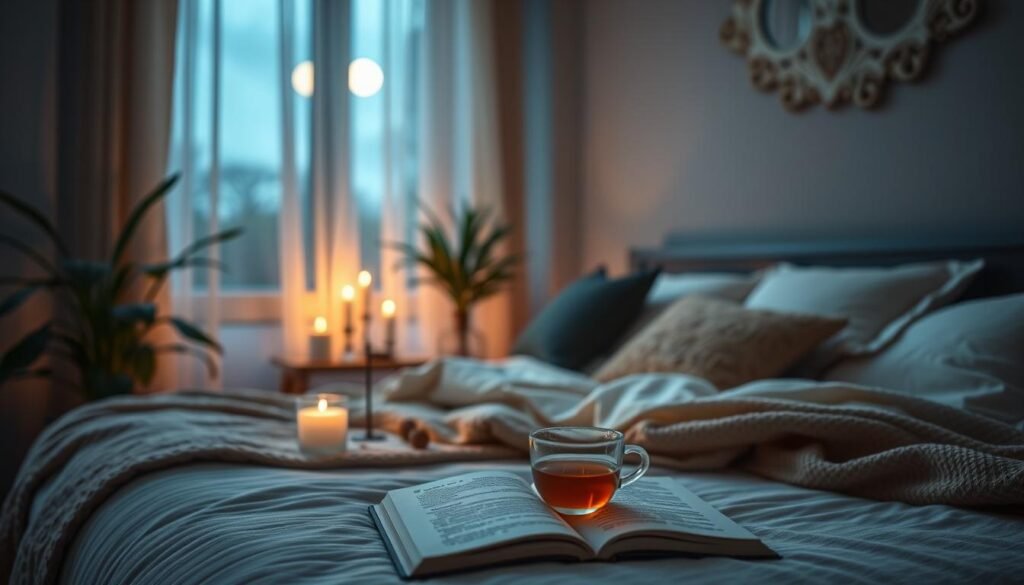Do we get enough sleep for our health? Sleeping 8.5 hours is key for our well-being. It helps our body fix itself, grow strong, and fight off sickness. We’ll look into why sleep is important and how to get the right amount each night.
To sleep well, we must know how sleep impacts our health. Needing more than 8 or 9 hours might mean a health issue. Sleeping less than 7 hours can harm our health. We’ll talk about the good of 8.5 hours of sleep and share tips for a better sleep space and bedtime routine.
Table of Contents
ToggleKey Takeaways
- Average sleep duration for healthy adults is 7-9 hours per night
- Sleeping 8.5 hours is vital for our health
- Good sleep habits and the right sleep time are key for well-being
- Needing more than 8 or 9 hours of sleep might signal a health problem
- Sleeping less than 7 hours can lead to health issues
- Creating a good sleep space and a bedtime routine can help you sleep better
Understanding Why 8.5 Hours of Sleep Matters
Sleep is key to our daily lives. Knowing why 8.5 hours is important helps us make better sleep choices. Studies show that 8.5 hours can make us smarter, happier, and less likely to get sick.
Our sleep goes through three stages: NREM, REM, and deep sleep. Each stage is important for good sleep. To sleep well, we need to understand the benefits of 8.5 hours.
The Science Behind Sleep Duration
About half of Americans feel tired often. Most adults need 7 to 8.5 hours of sleep, say sleep experts. A full sleep cycle is 90 minutes, and we need four to six cycles a day for best rest.
Benefits of 8.5 Hours vs Other Sleep Durations
Good sleep habits are key to feeling great. Sleeping 8.5 hours can improve our thinking, mood, and health. Some benefits include:
- Improved cognitive function
- Boosted mood
- Reduced risk of chronic diseases
Sleep Cycles and Their Impact
Knowing about sleep cycles helps us sleep better. The cycle has three stages: NREM, REM, and deep sleep. Each stage affects our sleep quality and duration. Understanding sleep cycles helps us sleep better and feel better.
By focusing on sleep and good habits, we can live better. It’s important to see the value in 8.5 hours of sleep. Making smart sleep choices helps us rest and feel our best.
| Sleep Stage | Duration | Benefits |
|---|---|---|
| NREM Stage One | 5-10 minutes | Onset of sleep |
| NREM Stage Two | Up to 25 minutes | Memory storage |
| NREM Stage Three (Deep Sleep) | 20-40 minutes | Restorative sleep |
| REM Sleep | 10-30 minutes | Dreaming and brain development |
Creating the Perfect Sleep Environment
A sleep-friendly environment is key for better sleep quality. To get this, focus on bedroom optimization. A dark, quiet, and cool room helps a lot. The National Sleep Foundation says a good sleep environment boosts sleep quality.
To make a sleep-friendly room, keep it cool. Use blackout curtains or earplugs if it’s too bright or noisy. A comfy mattress is also important. A sleep environment that fits your needs can greatly improve sleep. By making your bedroom better, you can sleep better too.
Here are some key factors to consider when creating a sleep-conducive environment:
- Keep the room dark, quiet, and cool
- Invest in a comfortable mattress
- Use blackout curtains or earplugs if necessary
By focusing on these, you can make a sleep environment that helps you sleep better. This supports your overall health and well-being.
By making your bedroom sleep-friendly, you’re on the right path. This is the first step to better sleep quality and a restful night’s sleep.
Establishing a Pre-Sleep Routine That Works
A consistent pre-sleep routine tells our body it’s time to sleep. This makes falling asleep and staying asleep easier. Activities like reading, meditation, or yoga relax the mind and body, getting them ready for sleep.
Adding relaxation techniques to our daily routine can improve our sleep. Some good techniques include:
- Deep breathing exercises
- Progressive muscle relaxation
- Mindfulness meditation
By having a regular pre-sleep routine and using relaxation techniques, we can sleep better. This leads to waking up feeling refreshed and ready to go. A good pre-sleep routine helps us sleep better, improving our health and happiness.
Remember, a regular sleep schedule is key for great sleep. By focusing on sleep and setting up a pre-sleep routine, we start a path to a healthier, happier life.
| Relaxation Technique | Benefits |
|---|---|
| Deep breathing exercises | Reduces stress and anxiety |
| Progressive muscle relaxation | Relaxes the muscles and calms the mind |
| Mindfulness meditation | Improves focus and reduces mind wandering |
How Can I Sleep 8.5 Hours Consistently?
To sleep 8.5 hours every night, start with a bedtime routine. Figure out your bedtime by counting back from when you wake up. For instance, if you wake up at 7:00 AM, aim for bed by 10:30 PM.
It’s also key to manage sleep debt. Sleep debt builds up when you don’t get enough sleep. It can harm your health. By making sleep a priority and sticking to a schedule, you can cut down your sleep debt and sleep better.

Weekends can be tough on sleep habits. Try to avoid late nights and have a calming bedtime routine. This tells your body it’s time to sleep. By focusing on sleep consistency and managing sleep debt, you’ll wake up feeling great.
Here are some tips for better sleep:
- Stick to a regular sleep schedule
- Have a calming bedtime routine
- Stay away from caffeine and screens before bed
- Make your bedroom a sleep-friendly space
Optimizing Your Bedroom for Quality Sleep
The bedroom environment greatly affects sleep quality. A comfy mattress and blackout curtains or earplugs can help. Here are some tips to make your bedroom better for sleep:
Bedroom optimization is key for better sleep. A good mattress is vital for a restful night. Choose one that supports and comforts your body well.
- Invest in a comfortable mattress that provides the right level of support and comfort for your body.
- Use blackout curtains or earplugs to create a dark and quiet environment.
- Keep the room cool and at a comfortable temperature.
These tips can make your bedroom sleep-friendly. A good bedroom helps you sleep well and feel refreshed. Sleep quality is important for your health and happiness.
Creating a sleep-friendly environment is key for better sleep. By following these tips and focusing on bedroom optimization, you’ll wake up feeling great.
| Tip | Description |
|---|---|
| Invest in a comfortable mattress | Look for a mattress that provides the right level of support and comfort for your body. |
| Use blackout curtains or earplugs | Create a dark and quiet environment to promote better sleep. |
| Keep the room cool and at a comfortable temperature | Aim for a temperature between 60-67 degrees Fahrenheit for optimal sleep. |
Natural Sleep Aids and Supplements
Many of us struggle to get a good night’s sleep. We often turn to natural sleep aids and supplements for help. These can include herbal solutions and mineral supplements. They can be a great addition to our sleep routine.
Herbal solutions like melatonin and valerian root help us relax. Mineral supplements like magnesium and calcium support sleep.
Some popular natural sleep aids include:
- Valerian root: known for its calming effects
- Chamomile: a soothing herb that can help with relaxation
- Melatonin: a natural hormone that regulates sleep-wake cycles
While natural sleep aids and supplements can help, they shouldn’t be the only solution. A consistent sleep schedule and a relaxing bedtime routine are also key. A sleep-conducive environment is important too. Always talk to a healthcare professional before adding new supplements.
By adding natural sleep aids and supplements to our routine, we can improve our sleep quality. Remember, a healthy lifestyle is essential. If sleep issues continue, always consult a healthcare professional.
Physical Activities That Promote Better Sleep
Regular physical activity can make sleep better. Yoga, walking, and swimming help relax and cut down stress. We’ll see how exercise helps with sleep promotion.
Studies show athletes with less sleep do worse in tests. But, Stanford University men’s basketball players sleeping more than 10 hours a night got better. They sprinted 5% faster and shot 9% more accurately.
- Improved sleep quality
- Increased sleep duration
- Enhanced athletic performance
Adding exercise to our day can lead to better sleep and health.
Managing Stress for Improved Sleep Duration
Managing stress is key to getting good sleep. Stress makes our bodies release hormones like cortisol, which can mess with our sleep. Techniques like mindfulness and breathing exercises can help lower stress and relax us.
Mindfulness is a great way to handle stress. It means being fully present and aware of our thoughts and feelings without judgment. We can do this through meditation, yoga, or just focusing on our breath for a few minutes each day. Adding mindfulness to our daily life can help us manage stress better and sleep better too.

Breathing exercises are also important for stress relief. Deep breathing can slow our heart rate, lower blood pressure, and calm our minds. Regular breathing exercises can help us relax and sleep better. Keeping a journal can also help manage stress and improve sleep. Writing down our thoughts and feelings before bed can help us process our emotions and clear our minds, making it easier to fall asleep.
Here are some tips for better sleep and stress management:
- Practice mindfulness and meditation to reduce stress levels
- Engage in regular breathing exercises to calm the mind and body
- Keep a journal to process emotions and clear the mind before bed
By using these stress management techniques every day, we can sleep better, feel less stressed, and wake up feeling great.
Common Sleep Disruptors to Avoid
Our lifestyle habits can greatly affect our sleep quality. Certain habits can disrupt our sleep, making it hard to get a good night’s rest. Sleep disruptors like caffeine, nicotine, and electronic devices before bed can harm our sleep.
Some common sleep disruptors include:
- Caffeine consumption in the afternoon or evening
- Nicotine use, specially close to bedtime
- Using electronic devices before bed, which can suppress melatonin production
It’s important to know about these sleep disruptors and how to avoid them. By changing a few lifestyle habits, we can sleep better and wake up feeling great.
Understanding and avoiding common sleep disruptors helps us sleep better and feel well. Poor sleep can harm our health. As we aim for 8.5 hours of sleep, being mindful of our habits is key to getting the best sleep.

Join 30,000+ subscribers for exclusive access to our Relaxing tips!
Tracking and Adjusting Your Sleep Pattern
We know how key it is to track and tweak our sleep patterns for better rest. Sleep monitoring tools give us insights into our sleep habits. They help us spot areas to get better.
These tools track sleep duration, quality, and stages. This info helps us see patterns and trends. For instance, if we wake up a lot, we might need to change our sleep space or bedtime routine.
Understanding our sleep data is key to making smart sleep changes. By looking at our data, we can find the best ways to sleep better. This might mean adjusting our sleep times, making our sleep area better, or having a calming bedtime routine.
Some big pluses of sleep tracking and monitoring are:
- Improved sleep quality
- More energy
- Better brain function
- Healthier overall life
Using sleep tracking and monitoring tools helps us understand our sleep better. This leads to better health and feeling more awake and ready for the day.
Conclusion: Your Journey to Consistent 8.5-Hour Sleep
As we wrap up our look at getting 8.5 hours of sleep, remember it’s a journey. The tips in this article can start you on the path to better sleep. But, keeping up with sleep consistency and sleep quality takes effort and flexibility.
Your sleep needs might change over time. What works now might need tweaking later. Keep an eye on your sleep, adjust as needed, and stay committed. With time and effort, you’ll see the benefits of good sleep.
See this journey as a positive step towards better health and happiness. By focusing on sleep, you’re improving your life in many ways. Aim for that 8.5 hours and enjoy the boost to your energy, mind, and body.
FAQ
What are the benefits of sleeping 8.5 hours?
Sleeping 8.5 hours boosts your brain power and mood. It also lowers the risk of serious diseases. Your body fixes itself, builds muscles, and boosts your immune system.
How do I create the perfect sleep environment?
For the best sleep, keep your room dark, quiet, and cool. Choose a comfy mattress. Use blackout curtains or earplugs if needed.
What is the importance of a pre-sleep routine?
A good pre-sleep routine is key. It includes relaxing activities like reading or yoga. Also, avoid screens and eat your last meal early.
How can I sleep 8.5 hours consistently?
To sleep 8.5 hours every night, figure out your bedtime. Manage your sleep debt. Use weekend sleep strategies to stay consistent.
What natural sleep aids and supplements can I use?
Natural sleep aids like melatonin and valerian root can help. So can magnesium and calcium. But talk to a doctor before trying them.
How can physical activities help promote better sleep?
Exercise like yoga or walking can improve sleep. Adding these to your daily routine can make you sleep better.
How can I manage stress to improve my sleep duration?
Stress can hurt your sleep. Try mindfulness, breathing exercises, or journaling. These can help you relax and sleep better.
What are common sleep disruptors to avoid?
Things like caffeine, nicotine, and screens before bed can mess with your sleep. Try to avoid or limit them to sleep better.
How can I track and adjust my sleep patterns?
Use sleep tracking tools to monitor your sleep. Understand the data and make changes based on it. This can improve your sleep quality.



Pingback: How To Relax My Brain? How To Relax My Brain? Essential T...
Pingback: How Can I Relax My Brain Fast?
Pingback: How To Calm My Mind From Overthinking?
Pingback: How Do You Calm Your Mind From Overthinking Quotes?